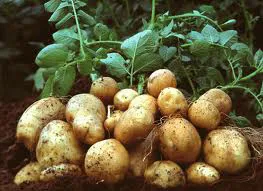 BASF has announced plans to scale down its European operations significantly and to cease attempts to sell its genetically modified produce in Europe altogether. It says its decision stems from continued opposition to GM technology in Europe from consumers, growers and politicians.
BASF has announced plans to scale down its European operations significantly and to cease attempts to sell its genetically modified produce in Europe altogether. It says its decision stems from continued opposition to GM technology in Europe from consumers, growers and politicians. GM technology has been applied by BASF to potatoes during the last years, including the "Amflora" potato, which had been admitted by the European Union in 2010. "Amflora" is genetically modified in order to express its starch content only in the form of amylopectin rather than in the form of amylose.
Amylopectin and amylose are both glucose polymer; although the first is more suitable to industrial applications than the latter.
Starch, an impressively versatile commodity
A great range of industrial applications comes from starch, with significant impacts in terms of sustainability.
- Paper- and cardboard manufacture: Starch improves the technical properties (e.g. it increases the paper’s firmness).
- Biotechnological raw material: Starch provides a substrate for growing the micro-organisms that generate useful end-products (e.g. vitamins, citric acid) through their metabolism.
- Textile industry: Starch ethers give yarns abrasion-resistance and smoothness. Swelling starch improves the product’s look and feel.
- Pastes and glues: Starches (e.g. swelling starch and starch ethers) are the basic raw materials.
- Pharmaceuticals and cosmetics: Use in powders, toothpaste and creams. Modified starches, used as additives in tablets, help them to dissolve in the body.
- Detergents: Starch is a starting material for bio-degradable sugar detergents.
- Bio-degradable materials: Starch is the raw material for plastic-like materials.
- Biofuel: Starch fermentation is the process for biofuel production.
- Bio-fertilizers: Starch is the basis for the creation of non chemical fertilizers.
Potatoes produce more starch than other crops (6.5 MT per hectare, against 3 MT/hectare from wheat and 4.5 MT/hectares from corn). Compared to starch from corn or wheat, potato starch has a higher viscosity, less electrical and thermal conductivity and a remarkable ability to "trap" the water.
Between its two components, amylose and amylopectin, the latter molecule is the most valuable for industrial applications. A potato for industrial use has a starch content about 17-20%, against 10% of potatoes for the table.
From the standpoint of environmental impact, moreover, the exploitation of water resources in the cultivation of the potato is far less than that required for the cultivation of corn or wheat.
GM potatoes and new scenarios for bio-materials
Potato starches can be processed into films, carrier bags, disposable cutlery and packaging materials. These bio-materials can replace petroleum oil-based products; they are capable of being sprayed, formed or expanded into various shapes and containers.
Bioplastics would be especially valuable in restricting the use of mineral oils and reducing waste if they were to be used more widely in short-lived products such as food-packaging, carrier bags, rubbish sacks and plant pots. Depending on how they are formulated, materials based on plant starches are biologically degradable; composting them brings the starches back into the production cycle.
At present, the worldwide capacity for producing bioplastics is less than 100,000 tonnes a year; however, the European Bioplastics Association forecasts a rapid increase in capacity, not least because of high oil prices and the question of climate change.
Experts predict that with today’s technologies, biomaterials would be able to replace 1 to 2 million tonnes-worth of mineral oil-derived disposable plastics, so long as worldwide production capacity increases correspondingly. This will of course mean greater demand for potato starch.
No doubt that those who will control GM potatoes will rule the world, included the "sleeping Beauty" Europe!
